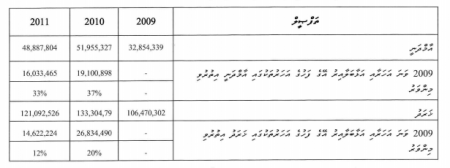The President’s Office (PO) spent MVR30.6 million (US$1.9 million) in excess of the approved budget in 2011 while MVR2.8 million (US$181,582) was used to cover expenses that were not directly related to the office’s mandate, the PO’s audit report (Dhivehi) has revealed.
Among the unrelated expenses were MVR1.8 million (US$116,731) spent on trips by former President Mohamed Nasheed to 88 islands ahead of the February 2011 local council elections, MVR904,855 (US$58,680) spent for then-Vice President Dr Mohamed Waheed to stopover in Singapore after attending the “Third Symposium on the European Academic Space” in Italy, and MVR139,676 (US$9,058) spent on a trip by the PO to check progress on the editing of ‘The Island President’ documentary.
While MVR526,454 (US$34,140) was spent for two trips to the United States by the vice president and his family, the report made public yesterday noted that there were no details of expenditure for MVR364,267 (US$23,623) of that amount.
Moreover, MVR235,556 (US$15,276) was spent out of the vice presidential residence’s budget for the vice president, his wife, child, and father to make the Hajj pilgrimage, but there were no details of expenditure for MVR60,524 (US$3,925) spent on food and accommodation.
“And while MVR69,112 (US$4,481) was spent for medical treatment during a trip by the vice president and his wife to Singapore in 2011, no documentation concerning the medical treatment was submitted,” the report stated.
Similarly, the report noted that MVR462,326 (US$29,982) was spent to cover the medical expenses of the president’s family in 2011, but were no documents related to the medical expenses.
A total of MVR677,369 (US$43,927) was meanwhile spent in 2011 on holidays for the president’s family, the report revealed.
Auditors also found that the PO paid mobile phone bills for political appointees out of the office’s budget in the absence of either a ceiling limit or rules to determine whether the calls were made for official purposes.
While MVR187,397 (US$12,152) was loaned from the PO budget to political appointees for personal expenses, auditors found that MVR184,191 (US$11,944) had not been repaid.
Moreover, MVR51,669 (US$3,350) was spent out of the vice presidential residence’s budget to pay mobile bills of the vice president’s wife, Madam Ilham Hussain, in contravention of the law governing privileges and state benefits for the vice president.
While the law stipulates that security for the vice president and his family must be arranged by the Ministry of Defence and National Security, auditors found that travel expenses for bodyguards during unofficial overseas trips by the vice president and his wife were settled out of the vice presidential residence, Hilaaleege’s budget.
Among other cases flagged in the report, auditors found that the PO had to pay MVR555,808 (US$36,044) as compensation to Shady Cabin after screws and sponges from 170 rented chairs went missing. The chairs were rented for the SAARC summit held in Addu City in November 2011.
The PO also covered expenses for foreign dignitaries out of its budget in the absence of rules for hospitality, the report noted.
Auditors found that MVR294,037 (US$19,068) was spent out of the presidential residence Muleeage’s budget for the stay of two British citizens from February 16 to 23.
Moreover, MVR29,058 (US$1,884) was spent out of the Muleeage budget for the “son of the president of a neighbouring country” to stay in a resort.
Auditors also discovered that there were 25 cable TV decoders in Muleeage and 12 decoders in Hilaaleege, for which MVR174,080 (US$11,289) and MVR81,917 (US$5,312) respectively was spent in 2011.
Lastly, auditors found that the PO did not maintain inventory records in accordance with public finance regulations. Plots of land and buildings under the care of the official residences of the president and vice president as well as fittings, furniture, and vehicles were not valued and included in the asset register.
